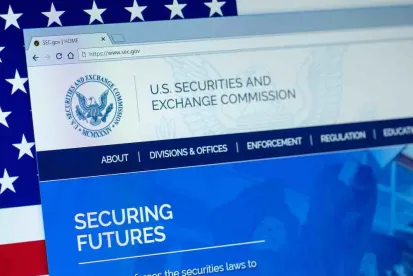On March 11, 2021, the staff of the SEC’s Division of Investment Management issued a statement soliciting industry feedback on the regulatory regime governing registered fund cross trading following the adoption of the new valuation rule in December 2020. Fund cross trades must be effected in accordance with Rule 17a-7 under the Investment Company Act. Absent further SEC staff guidance or SEC action, however, Rule 17a-7 may no longer be available for cross trades in fixed income securities beginning in September 2022, as a result of the new valuation rule’s definition of “readily available market quotations.”
Background
Funds engaging in cross trades with certain of their affiliates must do so in accordance with the conditions of Rule 17a-7. These conditions include, among others, that the trade be effected for “no consideration other than cash payment against prompt delivery of a security for which market quotations are readily available.”
Within new Rule 2a-5 under the Investment Company Act—the Valuation Rule—the SEC adopted a formal definition for the term “readily available market quotations.” The adopting release for the Valuation Rule makes clear that the new definition of readily available market quotations applies to all portions of the Investment Company Act and the rules thereunder, including with respect to cross trades under Rule 17a-7. (For more information on the new Valuation Rule, please see our alert here.)
Readily Available Market Quotations
Under the Valuation Rule, a market quotation is readily available only when that “quotation is a quoted price (unadjusted) in active markets for identical investments that the fund can access at the measurement date, provided that a quotation will not be readily available if it is not reliable.” This language is consistent with how Level 1 securities are valued under U.S. GAAP. Importantly, the adopting release for the Valuation Rule states that evaluated prices, indications of interest and accommodation quotes would not be readily available market quotations for purposes of the Valuation Rule because they are not based upon unadjusted quoted prices from active markets for identical investments. The unadjusted quote requirement would essentially prohibit any fixed income cross trades as such instruments are not exchange traded.
Industry Input
Noting that cross trading practices have evolved over the past several decades, and that the staff has gained considerable experience with the operation of Rule 17a-7, including through a number of enforcement actions brought by the SEC, the staff’s statement solicits industry feedback to help determine what, if any, recommendations the staff might make to the SEC in this area. Specific topics and questions that the staff expects to consider in formulating any recommendations to the SEC—and as to which industry engagement is welcome—include the following:
-
Current cross trading practices. Under what circumstances do funds currently engage in cross trading? To what extent do funds’ current cross trades not have readily available market quotations as defined in the Valuation Rule? What amount of cross trading occurs between two funds as compared to cross trading between a registered fund and another type of affiliate? What types of securities do funds currently cross trade? What types of securities do advisers believe they could cross trade under current Rule 17a-7, but choose not to rely on the Rule and instead to trade in the market? What types of securities would advisers like to cross trade but believe they cannot do so under the current Rule 17a-7?
-
Securities eligible to cross trade. What are the advantages and disadvantages of the threshold requirement in Rule 17a-7 that a security have a “readily available market quotation”? What sources of independent current market prices are used to cross trade securities under Rule 17a-7? What are the liquidity characteristics of securities that funds currently cross trade? Are cross traded securities valued in the same manner under Rule 17a-7 as they are under Section 2(a)(41) of the 1940 Act? What other criteria for the transactions would protect against conflicts of interest or other risks of cross trades?
-
Controls. What kinds of controls do advisers have in place to govern cross trading? What controls do advisers have in place to assess whether a cross trade is consistent with the adviser’s fiduciary obligation to its clients and is in the best interest of both the buying and selling fund? What controls do funds have in place to assess whether a cross trade is consistent with the investment policy of both the buying fund and the selling fund?
-
Market transparency. How does cross trading affect market transparency? How might transparency be enhanced for all market participants? To what extent might cross trades affect market efficiency because they are not publicly reported?
Appendix A to the staff’s statement outlines additional general topics of interest to the staff. The statement and appendix are available here.
Takeaways
Once the Valuation Rule becomes effective in 2022, the application of the Rule’s definition of readily available market quotations to cross trades under Rule 17a-7 represents a significant collateral consequence for asset managers accustomed to effecting cross trades for their funds. This outcome suggests that the SEC believes that the risks associated with cross trades, such as from conflicts of interest, outweigh the benefits. If that is the case, the SEC may not fully appreciate the significant benefits to registered funds from avoiding commissions and mark-ups involved with trading in the market. Moreover, unlike exchange-traded securities, which have enjoyed significant compression of commissions, fixed income securities have not.
Given the significant potential impacts for fixed-income funds, in particular, from a de facto prohibition on cross trades, industry participants are encouraged to respond to the SEC staff. For instance, industry participants may wish to share with the SEC staff information on the significant savings of cross trades for their funds. Although the staff requested feedback within 30 days after publication of the statement, the staff is still accepting feedback and we encourage concerned industry participants to respond.







 />i
/>i
